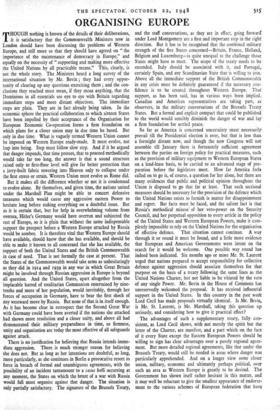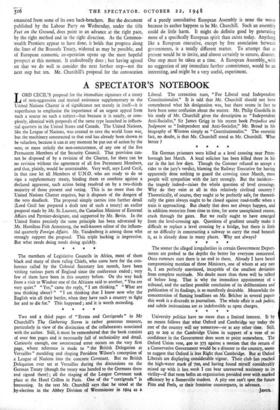ORGANISING EUROPE
THOUGH nothing is known of the details of their deliberations, it is satisfactory that the Commonwealth Ministers now in London should have been discussing the problems of Western Europe, and still more so that they should have agreed on " the importance of the maintenance of democracy in Europe," and equally on the necessity of " supporting and making more effective the United Nations by all practicable means." This, clearly, is not the whole story. The Ministers heard a long survey of the international situation by Mr. Bevin ; they had every oppor- tunity of clearing up any questions exercising them ; and the con- clusions they reached must mean, if they mean anything, that the Dominions in all essentials see eye to eye with Britain regarding immediate steps and more distant objectives. The immediate steps are plain. They are in fact already being taken. In the economic sphere the practical collaboration to which sixteen States have been impelled by their acceptance of the Organisation for European Economic Co-operation forms a firm foundation on which plans for a closer union may in due time be based. But only in due time. What is vaguely termed Western Union cannot be imposed on Western Europe ready-made. It must evolve, not leap into being. Step must follow slow step. And if it be argued that danger impends, that time presses, that to proceed methodically would take far too long, the answer is that a sound structure raised only to' first-floor level will give far better protection than a jerry-built fabric towering into Heaven only to collapse under the first stress or strain. Western Union must evolve as Rome did.
But it makes all the difference whether or not it is condemned to evolve alone. By themselves, and given time, the nations united under the Marshall Plan might be able to concert defensive measures which would cause any aggressive eastern Power to hesitate long before staking everything on a doubtful issue. But as it is certain that, but for help in overwhelming volume from oversea, Hitler's Germany would have overrun and subjected the rest of Europe, so it is plain that without the same indispensable support the prospect before a Western Europe attacked by Russia would be sombre. It is therefore vital that Western Europe should have available, should know that she has available, and should be able to make it known to all concerned that she has available, the support of both the United States and the British Commonwealth in case of need. That is not formally the case at present. That the States of the Commonwealth would take arms as unhesitatingly as they did in 1914 and 1939 in any war in which Great Britain might be involved through Russian aggression in Europe is beyond all question. And the United States, apart altogether from the implacable hatred of totalitarian Communism entertained by nine- tenths and more of her population, would inevitably, through her forces of occupation in Germany, have to bear the first shock of any westward move by Russia. But none of that is in itself enough. As it has become clear in retrospect that the Second Great War with Germany could have been averted if the nations she attacked had shown more resolution and a closer unity, and above all had demonstrated their military preparedness in time, so firmness, unity and organisation are today the most effective of all safeguards against attack.
There is no justification for believing that Russia intends imme- diate aggression. There is much stronger reason for believing she does not. But as long as her intentions are doubtful, as long, more particularly, as she continues in Berlin a provocative resort to force in breach of formal and unambiguous agreements, with the possibility of an incident tantamount to a casus belli occurring at any moment, the States on which the brunt of a war with Russia would fall must organise against that danger. The situation is only partially satisfactory. The signature of the Brussels Treaty, and the staff conversations, as they are in effect, going forward under Lord Montgomery are a first and important step in the right direction. But it has to be recognised that the combined military strength of the five States concerned—Britain, France, Holland, Belgium and Luxemburg—is quite unequal to the challenge those States might have to meet. The scope of the treaty needs to be extended. Italy should be associated with it, and Portugal, certainly Spain, and any Scandinavian State that is willing to join. Above all the immediate support of the British Commonwealth in any crisis must be definitely guaranteed if the necessary con- fidence is to be created throughout Western Europe. That support, as has been said, has in various ways been implied. Canadian and American representatives are taking part, as observers, in the military conversations of the Brussels Treaty States. But a formal and explicit compact that could be published to the world would sensibly diminish the danger of war and lay, a firm foundation for settled peace.
So far as America is concerned uncertainty must necessarily prevail till the Presidential election is over, but that is less than a fortnight distant now, and though the new Congress will not assemble till January there is fortunately sufficient agreement between the parties on foreign policy for practical measures, such as the provision of military equipment to Western European States on a lend-lease basis, to be carried to an advanced stage of pre- paration before the legislators meet. How far America feels called on to go is, of course, a question for her alone, but there are many evidences that public and political opinion throughout the Union is disposed to go that far at least. That such sectional measures should be necessary for the provision of the defence which the United Nations exists to furnish is matter for disappointment and regret. But facts must be faced, and the salient fact is that Russia's methodical misuse of her veto-power on the Security Council, and her perpetual opposition to every article in the policy of the United States and Western European Powers, make it com- pletely impossible to rely on the United Nations for the organisation of effective defence. That situation cannot continue. A way through it or round it must be found, and a little more evidence that European and American Governments were intent on the search for it would be welcome. One possible way round has indeed been indicated. Six months ago or more Mr. St. Laurent urged that nations prepared to accept responsibility for collective defence against aggression should associate themselves for that purpose on the basis of a treaty following the same lines as the United Nations Charter, but not liable to be vitiated by the veto of any single Power. Mr. Bevin in the House of Commons has unreservedly welcomed the proposaL It has received influential support in the United States. In this country in the past week Lord Cecil has made proposals virtually identical. Is Mr. Bevin, is Mr. St. Laurent, is Mr. Marshall, taking this question up seriously, and considering how to give it practical effect?
The advantages of such a supplementary treaty, fully con- sistent, as Lord Cecil shows, with not merely the spirit but the letter of the Charter, are manifest, and a pact which on the face of it every State except the Eastern European Powers should be willing to sign has clear advantages over a purely regional agree- ment. But more detailed regional agreements, like that under the Brussels Treaty, would still be needed in areas where danger was particularly apprehended. And on a longer view some closer union, military, economic and ultimately perhaps political, over such an area as Western Europe is greatly to be desired. The Government has shown itself rather hesitant in this matter, and it may well be reluctant to give the smallest appearance of endorse- ment to the various schemes of European federation that have emanated from some of its own back-benchers. But the document published by the Labour Party on Wednesday, under the title Feet on the Ground, does point to an advance at the right pace, by the right method and in the right direction. As the Common- wealth Premiers appear to have done, it holds that progress along the lines of the Brussels Treaty, widened as may be possible, and of European economic co-operation opens up the most hopeful prospect at this moment. It undoubtedly does ; but having agreed on that we do well to consider the next further step—not the next step but ten. Mr. Churchill's proposal for the convocation of a purely consultative European Assembly is none the worse because its author happens to be Mr. Churchill. Such an assembly could do little harm. It might do definite good by generating more of a specifically European spirit than exists today. Anything like a European executive, except by free association between governments, is a totally different matter. To attempt that at present would be to invite, and almost certainly to ensure, disaster. One step must be taken at a time. A European Assembly,,with no suggestion of any immediate further commitment, would be an interesting, and might be a very useful, experiment.



































 Previous page
Previous page